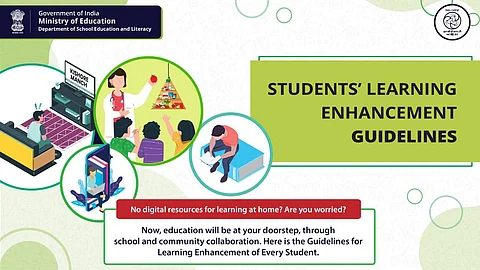

About 60 to 70 per cent students, teachers, parents and school principals from across India have said that the online mode of teaching and learning during COVID-19 period was joyful and satisfactory, according to a survey by the Ministry of Education. While 20-30 per cent said they had a difficult experience and 10-20% said that it was burdensome for them, in the survey undertaken by the NCERT on the accessibility of digital resources in schools to formulate the Students’ Learning Enhancement Guidelines.
A majority of them also pointed out that Mathematics as a subject was difficult to learn via the online medium. This is because Mathematics contains a number of concepts which require interaction, continuous support, monitoring from the teacher and these aspects were lacking in the online mode of teaching. Following this, Science was identified as the subject of concern since it contains several concepts and practical experiments which could only be done in the laboratory under the supervision of the teacher. Around 17 per cent of students also identified languages as being a difficult subject to learn through online medium.
Union Education Minister Ramesh Pokhriyal virtually released the guidelines on Wednesday to address concerns of low access to digital resources and to maintain continuity in school education for children. The recommendations given in these guidelines are based on a survey undertaken by the NCERT on the accessibility of digital resources in the schools of the Kendriya Vidyalaya Sangathan, Navodaya Vidyalaya Samiti and Central Board of Secondary Education and also on Continuous Learning Plan prepared for the States/UTs by the Ministry of Education.
The guidelines have also specified a model and provided suggestions for aiding learning enhancement for students who do not have access to digital devices. The suggestions provided include the pairing of students with no online amenities with those in the neighbourhood who have amenities for the online classes, utilising other broadcasting resources TV/Radio, printed study materials may be provided at their homes through various postal services or by the teachers, community mobile banks can be created where people can donate old but functional mobile phones, classes may be arranged in schools in a staggered manner for students who are unable to attend on-line classes due to non-availability of resources and a few more. The guidelines also added that teachers will need to "prepare specific learning plans separately for each of the children in No Digital Learning Device (NDLD) or Limited Digital Learning Device (LDLD) groups."
Pokhriyal highlighted that these guidelines will help children, who do not have digital resources to get learning opportunities at home with their teachers or volunteers. "Apart from this, it will also help in our efforts to overcome the learning deficiencies of all those students who are learning at home through various alternative ways ie, using Radio, TV, smartphones, etc," he added.
